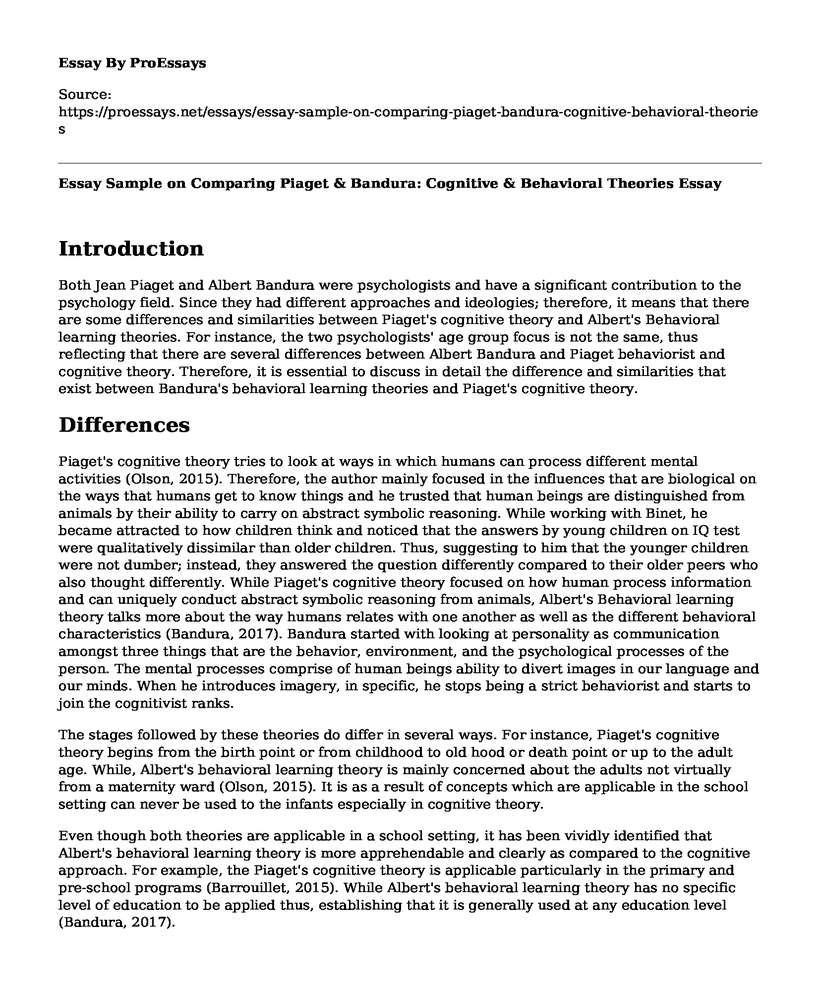Introduction
Both Jean Piaget and Albert Bandura were psychologists and have a significant contribution to the psychology field. Since they had different approaches and ideologies; therefore, it means that there are some differences and similarities between Piaget's cognitive theory and Albert's Behavioral learning theories. For instance, the two psychologists' age group focus is not the same, thus reflecting that there are several differences between Albert Bandura and Piaget behaviorist and cognitive theory. Therefore, it is essential to discuss in detail the difference and similarities that exist between Bandura's behavioral learning theories and Piaget's cognitive theory.
Differences
Piaget's cognitive theory tries to look at ways in which humans can process different mental activities (Olson, 2015). Therefore, the author mainly focused in the influences that are biological on the ways that humans get to know things and he trusted that human beings are distinguished from animals by their ability to carry on abstract symbolic reasoning. While working with Binet, he became attracted to how children think and noticed that the answers by young children on IQ test were qualitatively dissimilar than older children. Thus, suggesting to him that the younger children were not dumber; instead, they answered the question differently compared to their older peers who also thought differently. While Piaget's cognitive theory focused on how human process information and can uniquely conduct abstract symbolic reasoning from animals, Albert's Behavioral learning theory talks more about the way humans relates with one another as well as the different behavioral characteristics (Bandura, 2017). Bandura started with looking at personality as communication amongst three things that are the behavior, environment, and the psychological processes of the person. The mental processes comprise of human beings ability to divert images in our language and our minds. When he introduces imagery, in specific, he stops being a strict behaviorist and starts to join the cognitivist ranks.
The stages followed by these theories do differ in several ways. For instance, Piaget's cognitive theory begins from the birth point or from childhood to old hood or death point or up to the adult age. While, Albert's behavioral learning theory is mainly concerned about the adults not virtually from a maternity ward (Olson, 2015). It is as a result of concepts which are applicable in the school setting can never be used to the infants especially in cognitive theory.
Even though both theories are applicable in a school setting, it has been vividly identified that Albert's behavioral learning theory is more apprehendable and clearly as compared to the cognitive approach. For example, the Piaget's cognitive theory is applicable particularly in the primary and pre-school programs (Barrouillet, 2015). While Albert's behavioral learning theory has no specific level of education to be applied thus, establishing that it is generally used at any education level (Bandura, 2017).
Similarities
Both Albert's behavioral learning theory and Piaget's cognitive theory have a bearing concerning behaviorism since they trust that the environment surrounding the pupil mainly affects the pupil's performance in the different circles of his or her life (Olson, 2015). Piaget as a biologist was primarily interested in ways in which an organism acclimatizes to its environment, and adoption is driven by the biological drive to acquire a balance between the environment and schemes. While, Albert's behavioral learning theory that boils down to personality theory which argues that a person's situation causes a person's behavior (Bandura, 2017).
Another, the similarity between Albert's behavioral learning theory and Piaget's cognitive theory is that both of them have some stages which can be followed in attaining their goal. Also, two of them have contributed a lot to the field of psychology (Olson, 2015). For example, Piaget's cognitive theory there exist a process of coming to discern things and the several stages we follow to gradually obtain different opinions while in Albert's behavioral learning theory, some contributions are made which include that human beings store events in via visual images and via verbal codes when we process the dissimilar information.
Also, it is vividly clear that the two theories are applicable in a school setting. For instance, they can be applied in an education system for several learning kinds such as in discovery learning, guided learning, and others that support the growth as well as boosting the child's interests (Barrouillet, 2015). Therefore, being an assertion to the allegation that Albert's behavioral learning theory and Piaget's cognitive theory are both applicable in school set up (Bandura, 2017).
Conclusion
From the discussion, it can be vividly identified that both Albert's behavioral learning theory and Piaget's cognitive theory do possess several similarities and differences. They have a different application in a school setting, the different stages that they do follow, and the human different ability discussion. While the similarities are that both of them follow specific steps, they are applicable in a school setting, and they have a bearing on behaviorism as well as having a contribution in the psychology field.
References
Bandura, A. (Ed.). (2017). Psychological modeling: Conflicting theories. Transaction Publishers.
Barrouillet, P. (2015). Theories of cognitive development: From Piaget to today.
Olson, M. H. (2015). Introduction to theories of learning. Routledge.
Cite this page
Essay Sample on Comparing Piaget & Bandura: Cognitive & Behavioral Theories. (2023, Jan 04). Retrieved from https://proessays.net/essays/essay-sample-on-comparing-piaget-bandura-cognitive-behavioral-theories
If you are the original author of this essay and no longer wish to have it published on the ProEssays website, please click below to request its removal:
- Description and Symptoms of Bipolar Disorder Essay
- Adapted Physical Activity for Autism Spectrum Disorders in Childrens Essay Example
- Essay Example on Psychopaths: Impact on Criminal Justice Systems
- Essay Example on Understanding Human Behavior: Social Cognitive Theory
- Essay Example on Emotional Intelligence: Crucial for Interpersonal Communication & Business Success
- Free Essay Example on Childhood vs. Adulthood: Cognitive & Social Development
- Annotated Bibliography Example on Marital Stress Worsens Prognosis in Women with CHD







